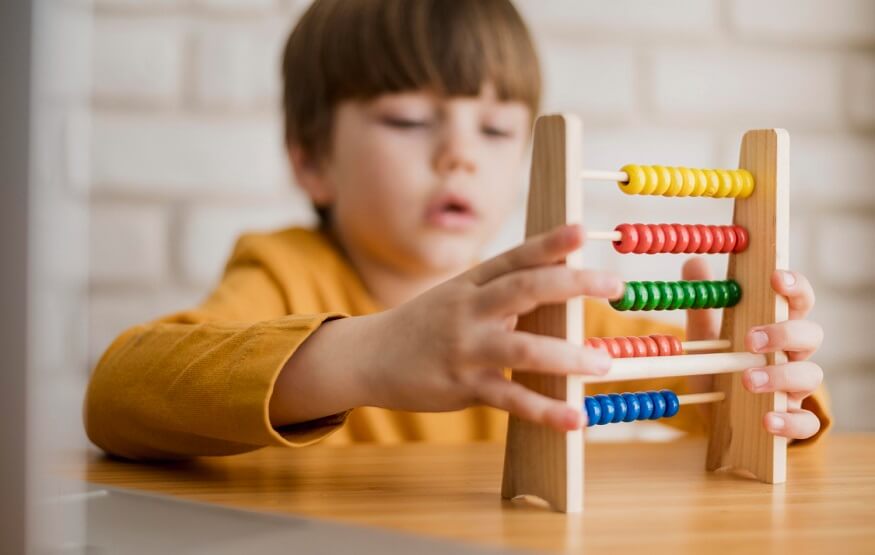Engaging children in maths indoor games at home offers a range of benefits that extend beyond mere entertainment. These games can foster a positive attitude toward maths, enhance mathematical skills, and promote cognitive development. Certainly, there are numerous engaging indoor maths games that can make learning maths enjoyable and interactive for kids right in the comfort of your home.
Also Read: Rebus Puzzles: What Are Rebus Puzzles? Types, Tips to solve, benefits
Best Maths Learning Games:
Here are some of the best maths related indoor games:
Maths Bingo: Create bingo cards with maths problems instead of numbers. Call out problems, and players mark the answers on their cards.
Counting and Sorting Games: Use everyday objects like buttons, toys, or candies for counting and sorting activities, enhancing early maths skills.
Maths Board Games: Games like Monopoly, Scrabble, or mathopoly adapt classic board games to reinforce maths concepts.
Number Line Hop: Create a makeshift number line on the floor using tape. Call out numbers or maths problems, and kids hop to the correct answer.
Dice maths: Roll dice and have kids perform maths operations using the numbers rolled. This can be adapted to addition, subtraction, multiplication, or division.
Maths Card Games: Play card games like “War” or “Go Fish,” replacing traditional card values with maths problems and solutions.
Maths Puzzles: Provide age-appropriate maths puzzles or Sudoku games that challenge kids’ logical thinking and problem-solving skills.
Shape Construction: Use geometric shapes like blocks, pattern blocks, or even cut-out paper shapes to build creative designs and learn about geometry.
Domino maths: Use dominoes to practise addition, subtraction, or even multiplication by having kids match and solve the numbers.
Maths Memory: Create pairs of cards with maths problems and their solutions. Turn the cards over and have kids match them by solving the problems.
Cooking maths: Involve kids in cooking or baking, where they can measure ingredients, adjust recipes, and understand fractions.
Maths Storytime: Incorporate maths into storytelling by letting kids create their own stories with maths problems as challenges to solve.
Maths Art: Use maths concepts to create art, such as drawing shapes, symmetry designs, or even graphing simple functions.
Indoor Scavenger Hunt: Hide maths-related clues around the house that lead kids to solve a final maths puzzle.
Maths Charades: Act out maths concepts, operations, or shapes for others to guess, adding a fun and active element to learning.
Measurement Adventures: Provide rulers, measuring tapes, and objects to measure around the house, exploring concepts like length, height, and weight.
Maths Karaoke: Create maths-themed songs or rhymes to help kids remember formulas, times tables, or other maths concepts.
Pattern Play: Use coloured objects or blocks to create and extend patterns, helping kids understand sequences and relationships.
Maths Relay Races: Setup challenges that involve solving maths problems before moving onto the next station, creating a competitive yet educational activity.
Maths Apps and Online Games: Utilise educational apps and online games that offer interactive maths lessons and activities tailored to different age groups.
These indoor maths games not only make learning maths engaging but also foster critical thinking, problem-solving, and mathematical reasoning skills. Adapt these games based on your child’s age and maths level for the most effective learning experience.
Also Read: Smart ways to introduce maths to your toddler
Benefits Of Playing maths Related Indoor Games:
Here’s why playing maths indoor games is important for kids:
Active Learning: Indoor maths games transform learning into an active and hands-on experience. Kids manipulate objects, interact with problems, and engage their senses, making learning more effective and memorable.
Real-World Application: Many indoor maths games use practical scenarios, making maths relevant to everyday life. This helps kids understand that maths is used in various situations, from cooking and shopping to solving problems.
Concept Reinforcement: These games provide opportunities to reinforce maths concepts in a fun and interactive way. Repetition through play helps solidify understanding and retention.
Critical Thinking: Indoor maths games often involve puzzles, problem-solving, and strategic thinking. This nurtures critical thinking skills as kids learn to approach challenges from different angles.
Confidence Building: Successfully solving maths problems in a game setting boosts children’s self-esteem and confidence in their mathematical abilities, which can positively influence their performance in traditional learning environments.
Reduced maths Anxiety: The stress-free and enjoyable nature of indoor maths games can help reduce maths anxiety, allowing kids to associate maths with positive experiences rather than stress.
Individualised Learning: Many games can be tailored to a child’s skill level, ensuring that the challenges presented are appropriate and motivating.
Multi-Sensory Engagement: Indoor games engage multiple senses, facilitating better understanding and memory retention of mathematical concepts.
Social Interaction: Certain indoor maths games encourage collaboration and healthy competition among siblings or friends, enhancing social skills and teamwork.
Parent-Child Bonding: Participating in indore maths games with children provides an opportunity for quality bonding time while learning together.
Motivation for Learning: Games tap into children’s intrinsic motivation to play and have fun. When learning is enjoyable, kids become more eager to explore and understand new concepts.
Versatility: Indoor maths games can be easily adapted to various age levels and mathematical topics, allowing kids to progress and explore different concepts at their own pace.
Problem-Solving Strategies: These games encourage kids to develop different problem-solving strategies, helping them approach challenges creatively and independently.
Preparation for Future Learning: The skills acquired through indoor maths games, such as
critical thinking, logical reasoning, and mathematical fluency, serve as a solid foundation for more advanced maths education.
Holistic Development: Indoor maths learning games contribute to a child’s holistic development by enhancing cognitive, social, emotional, and fine motor skills.
Also Read: Top 10 Ways to Utilise maths Formulas in Day-to-Day Life
Conclusion:
The significance of playing maths learning games with your kids at home is far-reaching. At EuroSchool, we believe that it sets the stage for a positive relationship with mathematics, nurturing skills that will serve them well throughout their academic journey and beyond. So, harness the power of indoor maths games to create an enriching educational experience that will benefit your children in both their academic journey and personal growth.









